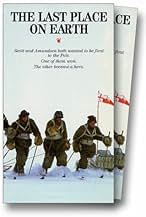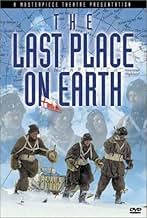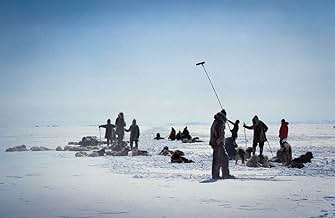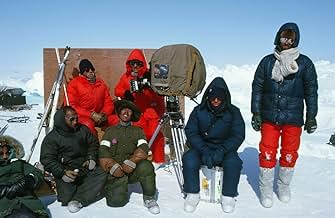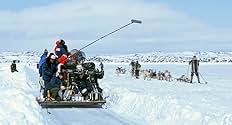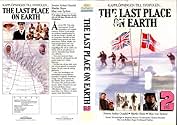Una exploración de la rivalidad entre el capitán Robert F. Scott y Ronald Amundsen en su intento de alcanzar el Polo Sur.Una exploración de la rivalidad entre el capitán Robert F. Scott y Ronald Amundsen en su intento de alcanzar el Polo Sur.Una exploración de la rivalidad entre el capitán Robert F. Scott y Ronald Amundsen en su intento de alcanzar el Polo Sur.
Explorar episodios
Argumento
¿Sabías que…?
- TriviaDirector Ferdinand Fairfax had previously worked with Martin Shaw on the TV series The Professionals (1977-81). Whilst he was unimpressed with Lewis Collins ego on that show, he was impressed by Shaw's acting range and desire to be offered more challenging material. So when he was asked to direct this miniseries he successfully lobbied the producers (who were considering Timothy Dalton among others) to meet Shaw. They too liked him and he was eventually offered the lead role.
- ErroresOn his return from the South Pole at 'Framheim,' Amundsen learns that the credit for reaching the North Pole has been taken away from Dr Frederick Cook and given instead to Peary. In reality, Amundsen was well aware of the controversy *before* his departure for Antarctica, and to avoid any question that he had not reached the true South Pole due to faulty navigation, staked out an area of ten miles around what he believed to be the Pole itself.
Opinión destacada
This is an extremely well-made, well-acted multipart drama about the "race" to the South Pole between Scott and Amundsen, based on a book by Roland Huntford. Huntford's book set out to debunk the myth of Scott of the Antarctic, and now many of his assertions are accepted as blythly as once the legend of Scott was accepted. Unfortunately, many of Huntford's assertions have themselves been debunked, and the book, while taking a critical view of Scott's preparations as compared to Amundsen's, still is interesting with its newfound trivia, is increasingly relegated to a status as an interesting fossil. Also interesting is that the off-screen Shackleton (now famous after the Kenneth Branagh movie) is always treated in the book and "The Last Place on Earth" as a polar savant and a superior force to Scott, actually had many of the same qualities Huntford attributes to Scott -- including inadequate planning -- but Shackleton got all his men home safely; whereas Huntford, and the movie, ascribe a death wish to Scott, which is absolutely undocumented.
Martin Shaw's Scott is irascible, peevish, and stupid, just as Huntford wanted him. He does seize upon good qualities as they come his way, but basically he's a whipped man, sent south from his wife's desire to have a great husband. Perhaps he just wants to go to the South Pole to get away from her.
Amundsen, the man who got to the South Pole first, is treated as a parfait knight in every way. The Norwegian scenes were as well done as the British scenes.
However, the film, in its debunking of the Scott legend, hides some evidence and creates other evidence. For instance, Scott's dislike of using dogs was not a hidebound reflex, but the fact that in an earlier expedition, dogs did not perform adequately. He knew his life would depend on them in the polar region, and his experience told them he could not rely on them. He thought the tractors and Siberian ponies would, however, be good replacements. Unfortunately, the ponies were more useless than the dogs might have been.
Amundseon, however, had problems himself. He never wanted to go south, but wanted the North Pole. Too bad: not one, but two men [both, if you know your history, outrageous liars] claimed the North Pole, Cook and Peary. Cook was a pal of Amundsen's from an earlier expedition where he'd saved many lives as a doctor. Though they were fast friends, Amundsen did not realize or blinded himself to the fact that Cook, when he could not achieve a feat (like climbing Mt. Mckinley) would lie about his achievements shamelessly. He was not only a fraud, he later became a swindler.
As one would expect in a movie like this, Cook is portrayed in a positive light; and he's obviously given North Polar priority, though in fact he never came within a thousand miles of the pole.
Amundsen, finding the glory he sought to the north taken from him by two skilled liars, neither of whom reached the North Pole in fact, decided to take the South Pole, because he was deeply in debt at the time and thought he would make money off it. So, telling the world he was heading north on a scientific expedition, went south instead. Scott, learning about this only when his expedition was on its way, was forced to expedite some of his own arrangements, thereby condemning his own polar party in a race he hadn't expected. And since he arrived at the pole only days after Amundsen, but nevertheless second, spent unnecessary time collecting useless scientific data, and collecting worthless rock samples, trying to ensure his own expedition served science, if nothing else; but he was swindled out of polar priority.
One area where Huntford is dead wrong, and the movie, is his complaints that Scott whined about the weather. In fact, we now know, as Scott could not with his more primitive weather gauging, that the weather was much worse than anyone could've expected; that under normal conditions as were known at the time, Scott's preparations would've been adequate; and it was by luck more than dogs and skis that Amundsen didn't get bogged down and die in the same conditions Scott had.
And Scott proved himself a man of honor, of course, in that Amundsen, perhaps snidely, left a letter for Scott to be taken back in case the Norwegian died; and Scott and his party died lugging home the letter, carefully preserved, that would've presented evidence to the world that Scott reached the pole second, even though at the time, no doubt the world would've taken an Englishman's word if Scott, like Cook and Peary, decided to lie about his achievements.
Unfortunately, the race to the south pole, unlike the race north, involved two basically honorable men, who felt forced by circumstances to chicanery: Amundsen, by lying to the world about the real purpose of his expedition; and Scott, by forcing his men to achieve the pole in an over-hasty way to beat his unexpected competitor.
As it turned out, both men got what they deserved. Scott, though it cost him his life, got the South Polar glory; and Amundsen got priority, though, since he started out his expedition with deception (as Cook and Peary ended their's) earned neither fame nor money, but only his place in history.
As Huntford's book is now seriously undermined in parts (especially in the new finds about the weather, which come from core samples unavailable at the time Huntford decided to undermine Britain's South Polar hero) it would be nice to see a new Scott and Amundsen show in the light of the new evidence, especially with such a fine cast and good production values as this show presented. But as that's not likely, this is the best version of that history you'll find. It was shot in Antarctic conditions, and the cast no doubt suffered.
Just keep in mind that its purpose was a hatchet job on a hero, and that Scott wasn't as bad, nor Amundsen so perfect, as the movie depicts; but both blow Cook and Peary out of the water as men of honor and greatness.
In an ideal world, Amundsen would've gotten credit for priority at the North Pole, which he wanted and deserved; and Scott would've gotten credit for the South Pole, which he deserved -- especially the way he and his men valiantly fought against the unexpected weather conditions with their then state-of-the-art (now primitive) methods. Both men deserved better than they got. And Scott deserves a better show than this. But this is the best polar drama ever, even compared to Branagh's wonderful "Shackleton".
Martin Shaw's Scott is irascible, peevish, and stupid, just as Huntford wanted him. He does seize upon good qualities as they come his way, but basically he's a whipped man, sent south from his wife's desire to have a great husband. Perhaps he just wants to go to the South Pole to get away from her.
Amundsen, the man who got to the South Pole first, is treated as a parfait knight in every way. The Norwegian scenes were as well done as the British scenes.
However, the film, in its debunking of the Scott legend, hides some evidence and creates other evidence. For instance, Scott's dislike of using dogs was not a hidebound reflex, but the fact that in an earlier expedition, dogs did not perform adequately. He knew his life would depend on them in the polar region, and his experience told them he could not rely on them. He thought the tractors and Siberian ponies would, however, be good replacements. Unfortunately, the ponies were more useless than the dogs might have been.
Amundseon, however, had problems himself. He never wanted to go south, but wanted the North Pole. Too bad: not one, but two men [both, if you know your history, outrageous liars] claimed the North Pole, Cook and Peary. Cook was a pal of Amundsen's from an earlier expedition where he'd saved many lives as a doctor. Though they were fast friends, Amundsen did not realize or blinded himself to the fact that Cook, when he could not achieve a feat (like climbing Mt. Mckinley) would lie about his achievements shamelessly. He was not only a fraud, he later became a swindler.
As one would expect in a movie like this, Cook is portrayed in a positive light; and he's obviously given North Polar priority, though in fact he never came within a thousand miles of the pole.
Amundsen, finding the glory he sought to the north taken from him by two skilled liars, neither of whom reached the North Pole in fact, decided to take the South Pole, because he was deeply in debt at the time and thought he would make money off it. So, telling the world he was heading north on a scientific expedition, went south instead. Scott, learning about this only when his expedition was on its way, was forced to expedite some of his own arrangements, thereby condemning his own polar party in a race he hadn't expected. And since he arrived at the pole only days after Amundsen, but nevertheless second, spent unnecessary time collecting useless scientific data, and collecting worthless rock samples, trying to ensure his own expedition served science, if nothing else; but he was swindled out of polar priority.
One area where Huntford is dead wrong, and the movie, is his complaints that Scott whined about the weather. In fact, we now know, as Scott could not with his more primitive weather gauging, that the weather was much worse than anyone could've expected; that under normal conditions as were known at the time, Scott's preparations would've been adequate; and it was by luck more than dogs and skis that Amundsen didn't get bogged down and die in the same conditions Scott had.
And Scott proved himself a man of honor, of course, in that Amundsen, perhaps snidely, left a letter for Scott to be taken back in case the Norwegian died; and Scott and his party died lugging home the letter, carefully preserved, that would've presented evidence to the world that Scott reached the pole second, even though at the time, no doubt the world would've taken an Englishman's word if Scott, like Cook and Peary, decided to lie about his achievements.
Unfortunately, the race to the south pole, unlike the race north, involved two basically honorable men, who felt forced by circumstances to chicanery: Amundsen, by lying to the world about the real purpose of his expedition; and Scott, by forcing his men to achieve the pole in an over-hasty way to beat his unexpected competitor.
As it turned out, both men got what they deserved. Scott, though it cost him his life, got the South Polar glory; and Amundsen got priority, though, since he started out his expedition with deception (as Cook and Peary ended their's) earned neither fame nor money, but only his place in history.
As Huntford's book is now seriously undermined in parts (especially in the new finds about the weather, which come from core samples unavailable at the time Huntford decided to undermine Britain's South Polar hero) it would be nice to see a new Scott and Amundsen show in the light of the new evidence, especially with such a fine cast and good production values as this show presented. But as that's not likely, this is the best version of that history you'll find. It was shot in Antarctic conditions, and the cast no doubt suffered.
Just keep in mind that its purpose was a hatchet job on a hero, and that Scott wasn't as bad, nor Amundsen so perfect, as the movie depicts; but both blow Cook and Peary out of the water as men of honor and greatness.
In an ideal world, Amundsen would've gotten credit for priority at the North Pole, which he wanted and deserved; and Scott would've gotten credit for the South Pole, which he deserved -- especially the way he and his men valiantly fought against the unexpected weather conditions with their then state-of-the-art (now primitive) methods. Both men deserved better than they got. And Scott deserves a better show than this. But this is the best polar drama ever, even compared to Branagh's wonderful "Shackleton".
- vox-sane
- 5 may 2002
- Enlace permanente
Selecciones populares
Inicia sesión para calificar y agrega a la lista de videos para obtener recomendaciones personalizadas
- How many seasons does The Last Place on Earth have?Con tecnología de Alexa
Detalles
Contribuir a esta página
Sugiere una edición o agrega el contenido que falta

Principales brechas de datos
By what name was The Last Place on Earth (1985) officially released in India in English?
Responda
